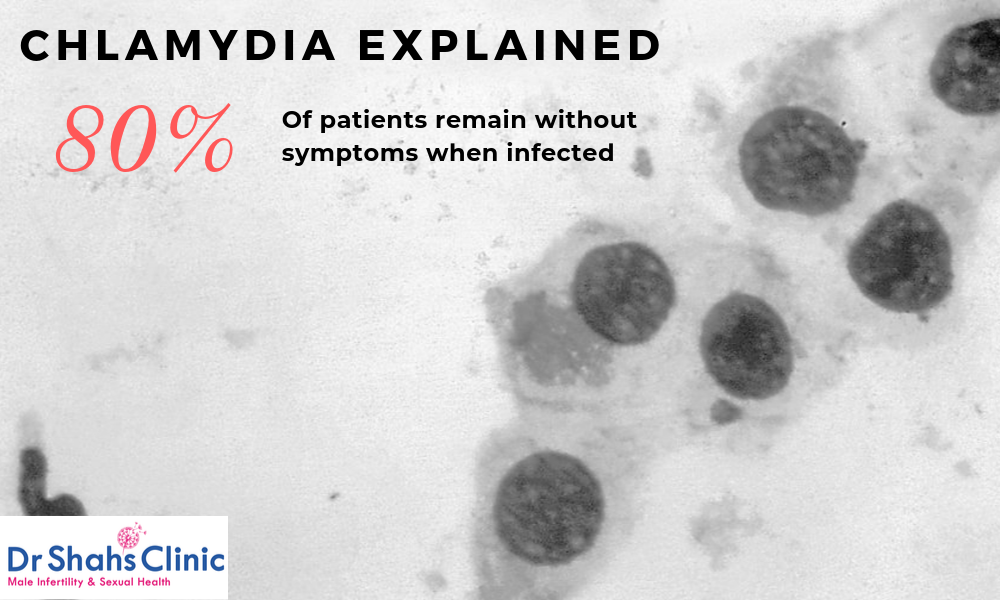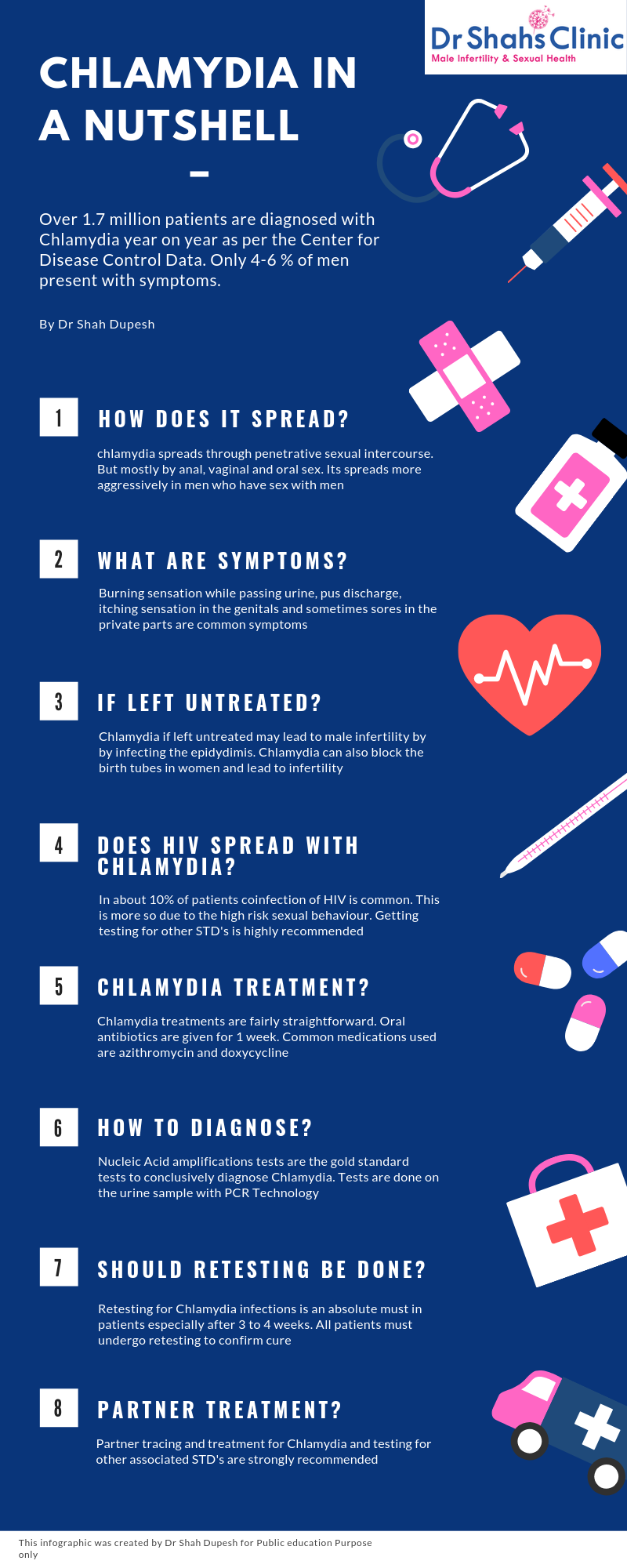Chlamydia Treatment, Symptoms, Diagnosis & Risk Factors
Vanakkam, Namaste, and Welcome to Dr. Shah’s Clinic for Male Infertility & Sexual Health.
In this article, I am going to tell you everything under the sun about undergoing a chlamydia treatment in chennai.
We are also going to discuss about Chlamydia its symptoms, diagnosis and management.
Here is quick infographic for you below
What is Chlamydia? How common is Chlamydia?
Chlamydia is a sexually transmitted infection caused by a bacterium called Chlamydia trachomatis.
An estimated 1.7 million people are newly infected with chlamydia every year.
Moreover, close to over 70% of patients do not present any symptoms of the infection.
Chlamydia needs immediate treatment. If left untreated, chlamydia can cause serious adverse events.
Chlamydia Symptoms
Please remember that in a large proportion of patients will not present with any symptoms of Chlamydia as such!.
Some common symptoms of Chlamydia include
- Burning sensation while passing urine
- Foul-smelling discharge from the penis
- Pain in and around the genitals
- Sores in and around the genitals
- Pain in the rectum
- Anal bleeding
- Eye infection
The symptoms of chlamydia usually occur several weeks after the exposure.
How does Chlamydia Spread?
The most common method of chlamydia spreading is by penetrative sexual intercourse.
This is more so when contact has occurred with multiple partners. Some populations who are at high risk of contracting Chlamydia include
A. Men who have sex with men
B. Bisexuals
C. Men or women who constantly engage in unprotected contact with multiple people
On an important point, Chlamydia does not spread through kissing, hugging or sharing glasses with an infected person.
Chlamydia seems to be more common in women than in men. The Center for Disease Control (CDC) recommends testing for Chlamydia on a yearly basis for all women who are sexually active and under 25 years of age.
Chlamydia can also spread by oral sex and can cause ulcers and lesions in the oral cavity when contact has occurred with an infected yet untreated person.
Patients may not be aware that they are actually carrying the infection in the throat.
Chlamydia in Women
Chlamydia as an infection is notoriously silent.
In women, Chlamydia can obstruct the birth tubes by causing pelvic inflammatory disease.
Some common symptoms of Chlamydia in women include
- Active bleeding during periods
- Painful vaginal discharge
- Pain during sexual intercourse
- Lower abdominal pain
- Cervicitis
In women, if Chlamydia is left untreated, pelvic inflammatory disease can occur which is technically a medical emergency.
In PID or pelvic inflammatory disease, infections ascend up to reach the tubes.
Patients with PID can experience severe fever, abdominal pain and vaginal bleeds in between their periods.
What happens if Chlamydia is left untreated?
Chlamydia if left untreated in men can lead to problems that can cause male infertility.
Untreated chlamydia can cause swelling of the epididymis (a small storage structure for sperm above the testis). This is called epididymitis, if left untreated can lead to blockages in the sperm transit pathways leading to fertility issues.
In some instances, the infection can spread to the prostate gland leading to severe male chlamydial urethritis. This results in intercourse that is very painful in general.
In women, untreated PID can cause tubal obstruction, which again can severely affect a woman’s ability to conceive naturally.
Chlamydia & Gonorrhea: What’s the difference?
Interestingly, both chlamydia and gonorrhea, share a similar symptom profile. Both infections spread through unprotected contact and both cause a similar set of symptoms.
Both infections can cause a burning sensation while passing urine and also cause fever and/or rectal bleeds.
When you visit a specialized std clinic for treatment, your sexologist will screen you for both chlamydia and gonorrhea.
Not just that in patients with suspected Chlamydia, its not uncommon to find co-infection with HIV as well.
Getting tested for all common STDs as below is recommended in.
Some common STD’s that your doctor will routinely screen and treat you for include
- Chlamydia
- Gonorrhea
- HIV 1 & 2
- Herpes Infection
- Syphilis
- Hepatitis B
- Hepatitis C
Furthermore, your doctor will also order additional testing like complete blood count and Urine culture and sensitivity to screen for other bacterial infections.
How Is Chlamydia Diagnosed?
As per the American Academy of Family physicians, recommends using a Nucleic acid amplification test for Chlamydia.
This is test has very high sensitivity and specificity for detecting the bacterium.
At Dr. Shah’s Clinic we use the Chlamydia PCR test for diagnosing Chlamydia infection in men.
A first void urine sample is better (although not compulsory) when testing for Chlamydial infections in men. Rectal swabs or oropharyngeal swabs can also be used for testing chlamydia.
In women, vaginal swabs are used in addition to a physical examination.
Point of care testing is usually recommended with your doctor.
Chlamydia Treatment & Recommendations
So,
The recommended treatment regimens for Chlamydia treatment include
A. Tab Azithromycin 1 g oral dose (single dose) OR
B. Tab Doxycycline 100 mg, 1 tablet in the morning and 1 tablet in the night for 7 days OR
C. Tab Erythromycin 500 mg 4 times a day for 7 days OR
D. Tab Levofloxacin 500 mg 1 daily for 7 days
More importantly, it is strictly recommended to avoid or abstain from sexual intercourse during the complete course of medications.
Here are some patient recommendation as per the American Academy of family physicians (AAFP)
- Diagnosis of Chlamydia is best made with nucleic acid amplification tests
- Retesting for men and non-pregnant women are recommended after 4 weeks post the treatment
- Partner testing is recommended if the diagnosis is made within 60 days of exposure, partner chlamydia treatment is strongly recommended
- Complete abstinence from sexual intercourse is recommended during the course of treatment
- For pregnant women, retesting for a ‘test of cure’ is compulsory
How to prevent Chlamydia?
Interestingly, while chlamydia treatment is fairly straightforward and well-proven, we believe in the age-old adage – ‘prevention is better than cure’.
Chlamydia infection can be prevented by
- Avoiding contact with multiple partners
- Engaging in stable monogamous relationships preferably
- Using condoms appropriately and correctly.
That’s about it!
I hope you enjoyed reading this article on Chlamydia treatment. If you are still worried about undergoing a chlamydia treatment in chennai, do get in touch with us below! We will definitely help you with your problem!
Dr. Shah’s Clinic for Male Infertility & Sexual Health
No 21, Ground Floor, Bazullah Road, T. Nagar, Chennai, Tamil Nadu 600017
Ph – +91-9790783856
References
- https://www.aafp.org/afp/2012/1215/p1127.html
- https://www.cdc.gov/std/chlamydia/stdfact-chlamydia.htm


